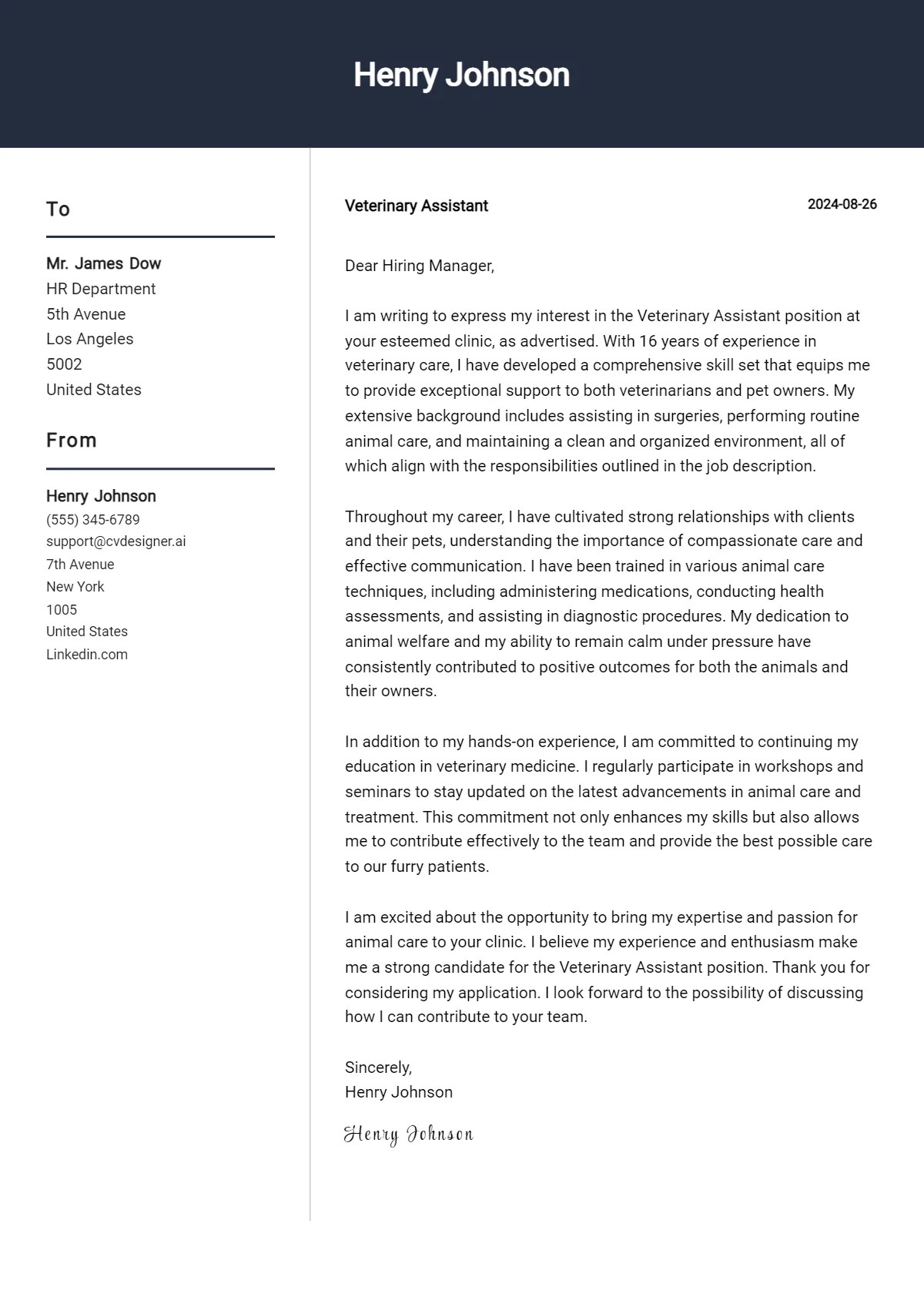Why a Veterinary Assistant Cover Letter is Crucial
A veterinary assistant cover letter is your first impression on a potential employer. In a competitive job market, a well-crafted cover letter can set you apart from other applicants and significantly increase your chances of landing an interview. It provides an opportunity to highlight your relevant skills, experience, and passion for animal care, all of which are crucial for succeeding in this field. A cover letter allows you to explain why you are the ideal candidate for the specific position and express your enthusiasm for the clinic or hospital. Without a strong cover letter, your application might get overlooked, even if your resume is excellent. A well-written cover letter helps demonstrate your communication skills and professionalism, two essential qualities for a veterinary assistant. This document allows you to personalize your application and show that you’ve taken the time to understand the job requirements and the clinic’s values. Furthermore, a cover letter provides space to elaborate on experiences that might not fully come across in your resume, such as volunteer work, extracurricular activities, or personal projects related to animal care. This helps give the employer a fuller understanding of your profile and suitability for the role.
Understanding the Role of a Veterinary Assistant
Before you begin writing your cover letter, it’s important to understand the multifaceted role of a veterinary assistant. Veterinary assistants play a critical role in supporting veterinarians and veterinary technicians in providing care to animals. Their responsibilities are varied, including tasks like taking patient histories, assisting with examinations, preparing and administering medications, and providing comfort and care to animals. They often handle administrative duties such as scheduling appointments and managing client communications. Veterinary assistants are also involved in laboratory work, such as collecting samples and performing basic tests. Success in this role requires a combination of compassion, technical skills, and effective communication abilities. You should showcase these crucial elements on your cover letter. Moreover, a veterinary assistant needs to be comfortable working in a fast-paced environment, handling a variety of animals, and dealing with potentially stressful situations. They must also be able to work as part of a team, collaborating with veterinarians, technicians, and other staff members to ensure the best possible care for animals. Understanding these requirements will allow you to better tailor your cover letter to demonstrate your suitability for the position.
Key Skills to Highlight in Your Cover Letter
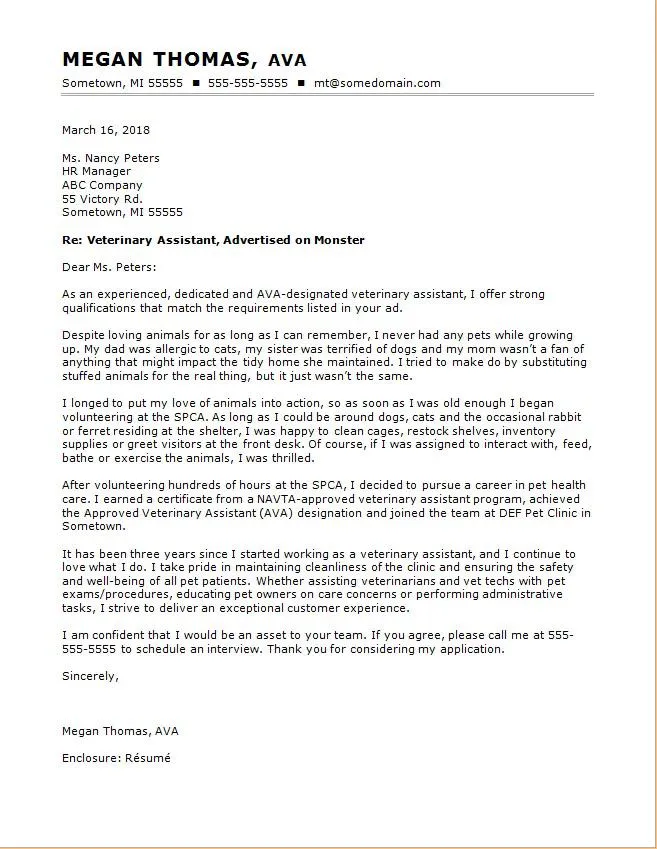
Your cover letter should highlight a range of skills that demonstrate your suitability for the veterinary assistant role. These skills can be broadly categorized into relevant skills, technical skills, and soft skills. Tailoring your skills to align with the specific job description will greatly enhance your cover letter’s impact. Use the job description as a guide to determine which skills are most important to the employer. Make sure you provide specific examples where you have demonstrated these skills, and highlight how your abilities can benefit the clinic. These should show why you are a great candidate and will give you an advantage when the hiring manager starts to review your application.
Relevant Skills
Relevant skills are those directly related to the duties and responsibilities of a veterinary assistant. These may include experience with animal handling, assisting during medical procedures, and knowledge of common animal illnesses and treatments. Proficiency in taking patient histories, accurately recording vital signs, and administering medications are also crucial. If you have experience in specific areas like dentistry, radiology, or surgical assistance, be sure to mention these skills. Any previous experience working in a veterinary clinic, animal shelter, or boarding facility should be prominently featured. You could discuss how you managed animal care, supported veterinary staff, or handled customer service. Specific examples of how you have used these skills to positively impact animal care are essential to include.
Technical Skills
Technical skills involve your practical abilities and knowledge. This includes proficiency in operating medical equipment, preparing samples for laboratory tests, and performing basic first aid and emergency procedures. Knowledge of veterinary terminology, pharmacology, and common medical protocols is valuable. Mention any specific software or systems you are familiar with, such as practice management software. If you have experience with administering injections, collecting blood samples, or taking radiographs, these are highly sought-after skills to emphasize. Provide specific examples of tasks you have performed, such as assisting with surgeries or monitoring anesthesia, to demonstrate your competence. Demonstrating these skills effectively can significantly increase your chances of getting hired.
Soft Skills
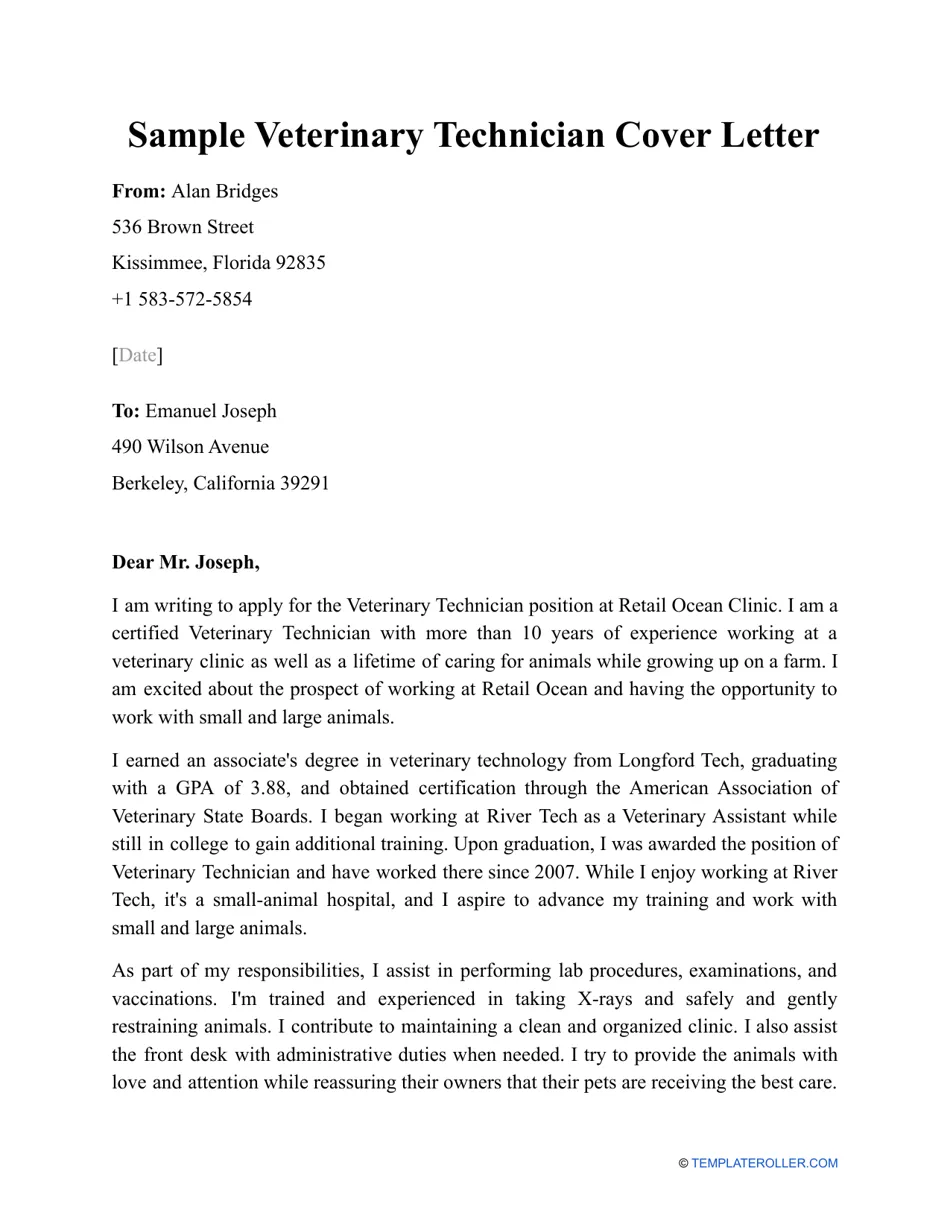
Soft skills are the personal attributes that enable you to interact effectively and harmoniously with other people. These include communication skills, empathy, patience, and the ability to work well within a team. Emphasize your ability to communicate clearly and compassionately with both pet owners and veterinary staff. Highlight your problem-solving skills and your ability to stay calm under pressure, especially during emergencies. Your cover letter must mention your ability to work well with a team and your willingness to learn and take on new responsibilities. Provide examples of how you have demonstrated these soft skills in past roles. For instance, describe a situation where you successfully resolved a conflict with a client or assisted a stressed animal, or showcase your ability to effectively communicate complex medical information.
Structuring Your Veterinary Assistant Cover Letter
A well-structured cover letter will help you showcase your qualifications effectively. The format should be clear, concise, and easy to read, allowing the hiring manager to quickly grasp your key qualifications and interest in the position. Proper formatting and organization demonstrate your attention to detail, and professionalism. This section describes the key components that make up a strong cover letter, from the header to the closing. Your goal should be to provide a clear and compelling narrative that highlights your strengths and makes you stand out from the competition. Consider using a professional template to ensure your cover letter looks polished and well-organized. This will make it easier for the reader to follow your points and appreciate your qualifications.
Header and Contact Information
The header of your cover letter should include your full name, contact information (phone number and email address), and the date. If you know the name of the hiring manager, include their name, title, and the veterinary clinic’s address. If you don’t know the hiring manager’s name, research it on the clinic’s website or LinkedIn. Always use a professional email address. The header provides essential information and a professional appearance. Including the date ensures that the cover letter is current. This information makes it easy for the employer to contact you and gives a professional impression. Make sure your contact information is accurate and up-to-date to avoid any delays in communication. The header should be formatted consistently and be easy to read.
Greeting and Introduction
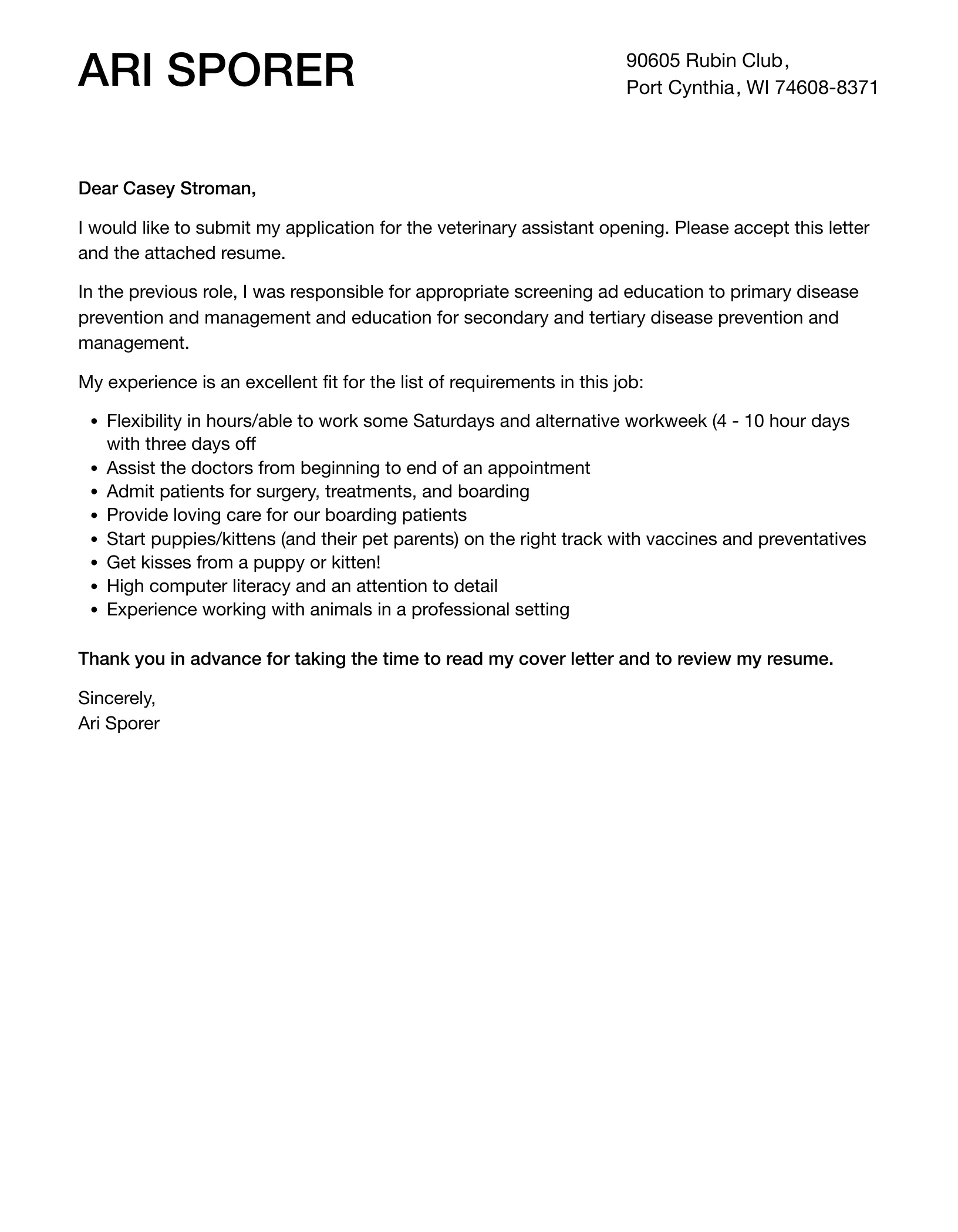
Start your cover letter with a professional greeting. Addressing the hiring manager by name is ideal, if possible. In the introduction, state the position you are applying for and where you found the job posting. Briefly mention your interest in the role and the veterinary clinic. The introduction should be concise and attention-grabbing. This is your first chance to make a positive impression and demonstrate your enthusiasm for the position. Make sure the greeting is appropriate and professional. This shows you have put effort into researching the clinic and personalizing your application. The introduction should set the stage for the rest of your cover letter, highlighting your key qualifications and your passion for animal care.
Body Paragraphs Crafting Your Message
The body paragraphs are where you elaborate on your qualifications and demonstrate how you meet the job requirements. Use these paragraphs to showcase your skills and experience, and provide specific examples to support your claims. Each paragraph should focus on a key skill or aspect of your experience. Structure your paragraphs logically, using clear and concise language. Use strong action verbs to describe your accomplishments. Show rather than tell – provide concrete examples of how you have applied your skills in past roles. The body paragraphs are your opportunity to connect your skills and experience to the needs of the clinic. This is where you make your case for why you are the ideal candidate, so emphasize the elements that best match the job requirements. This will clearly convey your suitability to the hiring manager.
Highlighting Your Experience
Use one or two paragraphs to highlight your relevant work experience. Mention previous roles, internships, or volunteer work in veterinary clinics, animal shelters, or similar settings. Describe your responsibilities and accomplishments in each role. Focus on experiences that align with the job requirements. Quantify your accomplishments whenever possible. For instance, state the number of animals you assisted with daily, or the number of procedures you helped with. Provide specific examples of tasks you have performed, like assisting with surgeries, administering medications, or providing client education. Your experience is a cornerstone of your cover letter, so make sure you present it clearly and effectively. Your experience provides concrete evidence of your abilities and suitability for the role.
Showcasing Your Skills
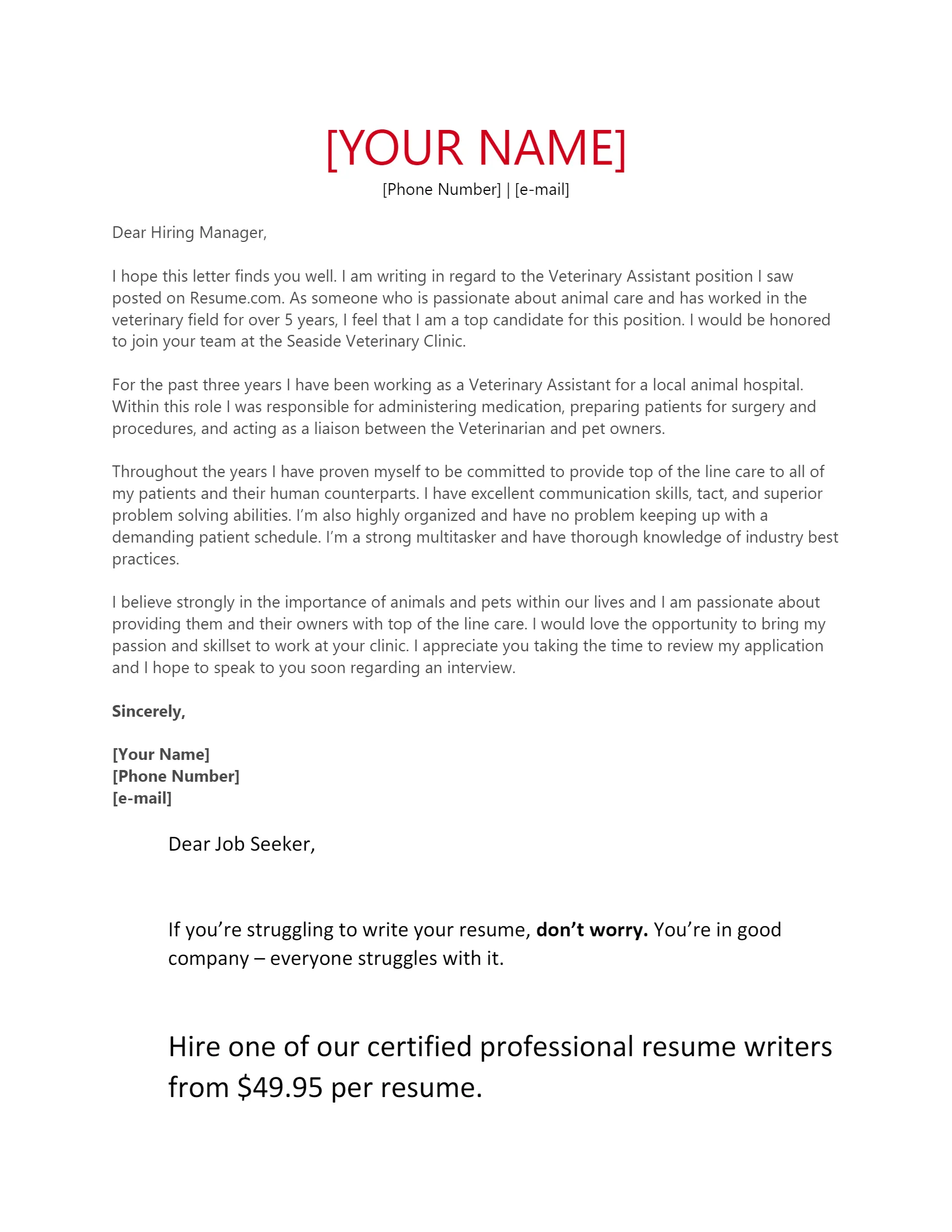
Devote one or two paragraphs to showcase your key skills. Refer back to the job description to identify the most important skills the employer is seeking. Provide specific examples of how you have demonstrated those skills in your past roles. If the job description emphasizes communication skills, describe how you have effectively communicated with pet owners and veterinary staff. If the job requires technical skills, such as administering medications or performing lab tests, give specific examples of your proficiency. This is where you must match your skills to the job’s requirements. Include examples that show your competence, so the hiring manager can clearly see how you can contribute to their clinic. This will set you apart from other applicants, showing you can handle the responsibilities of the role.
Expressing Your Passion
Your cover letter should reflect your passion for animal care and the veterinary profession. Explain what motivates you to work as a veterinary assistant. Mention your love for animals and your desire to contribute to their well-being. Research the clinic and mention anything that resonates with you, such as its mission, values, or specializations. Tailor your cover letter to the clinic. Personalize it to show your genuine interest. This demonstrates to the employer that you are genuinely interested in the position. Include details about your experiences or your interests, such as volunteering at an animal shelter or owning pets. This will help make your cover letter more engaging and memorable, while letting the employer know about your passion for helping animals.
Closing and Call to Action
In the closing paragraph, reiterate your interest in the position and thank the hiring manager for their time and consideration. State your availability for an interview. Include a call to action by expressing your eagerness to discuss your qualifications further. Provide your contact information again, just in case. Ensure that your closing is professional and polite. Your closing provides the final opportunity to leave a positive impression. By providing your contact information again, you make it easy for the hiring manager to reach you, and inviting them to contact you expresses your enthusiasm for the position. Ending your letter on a positive note helps solidify your interest in the role.
Formatting and Proofreading Your Cover Letter
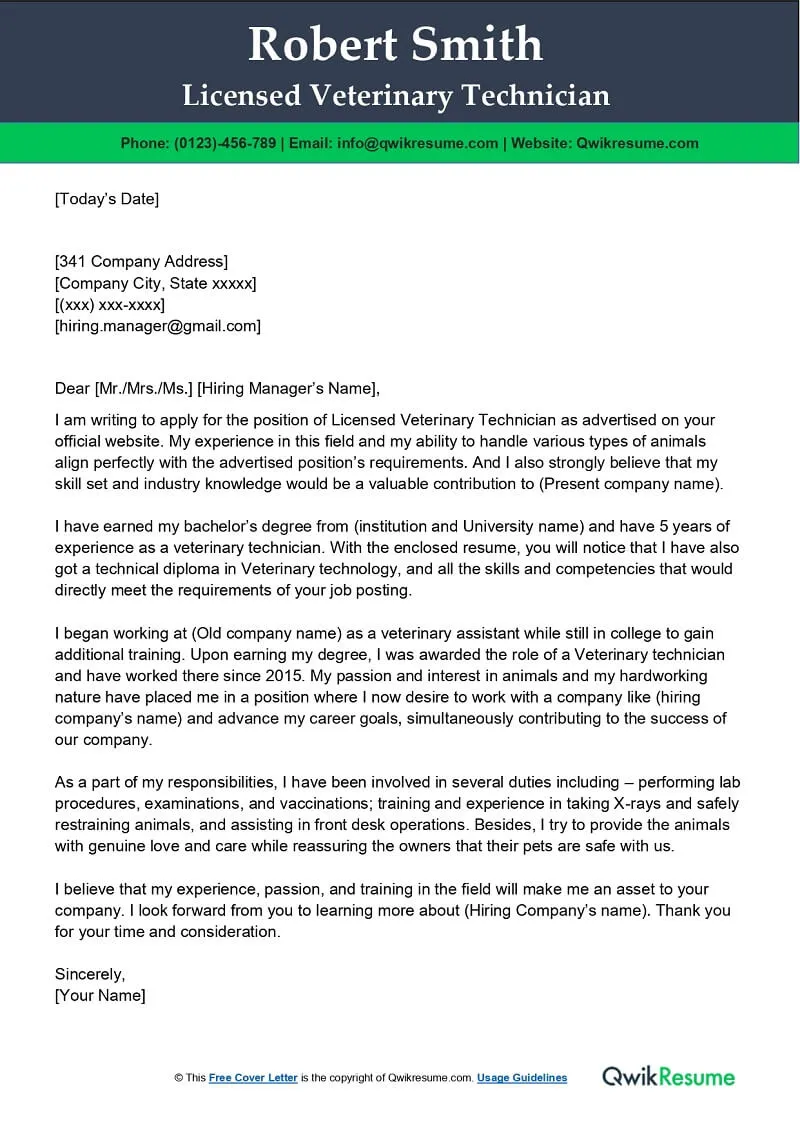
Formatting and proofreading are crucial to ensure that your cover letter is professional and error-free. Use a clear and easy-to-read font, such as Times New Roman, Arial, or Calibri. Maintain consistent formatting throughout the document, including font size, line spacing, and margins. Proofread your cover letter carefully for any spelling, grammar, or punctuation errors. Ensure that your sentences are well-structured and that your language is clear and concise. Proofreading is an essential step in the job application process. These elements demonstrate your attention to detail, and you should always use a professional tone. A poorly formatted or error-filled cover letter can undermine your credibility and hurt your chances of landing an interview. Ask someone else to proofread your cover letter. This is a simple, yet important step.
Common Mistakes to Avoid
Several common mistakes can undermine your cover letter and hurt your chances of getting hired. One of the most frequent errors is using generic, cookie-cutter cover letters. It’s critical to tailor your cover letter to each specific job and clinic, to showcase your interest. Avoid excessive length. Keep your cover letter concise and focused, ideally within one page. Grammar and spelling errors can be a deal-breaker. Always proofread your cover letter thoroughly. Failing to highlight your key skills and experience is another mistake. Clearly state your skills and qualifications, and give concrete examples of how you have used them in your past experiences. Avoid negative language and focus on what you can offer the employer. Never include false or misleading information. This could damage your reputation and career.
Using Keywords Effectively
To ensure your cover letter gets noticed by both the hiring manager and any applicant tracking systems, incorporating relevant keywords is crucial. Analyze the job description to identify the key skills, qualifications, and responsibilities that the employer is seeking. Integrate these keywords naturally throughout your cover letter. Use the same keywords in your resume, which should align with your cover letter. Use different variations of the keywords to improve your chances of matching the job requirements. By using keywords effectively, you can increase the likelihood that your cover letter will make it through the initial screening process, and that the hiring manager will give your application serious consideration. This also helps demonstrate that you are an excellent fit.
Tailoring Your Letter to the Specific Job
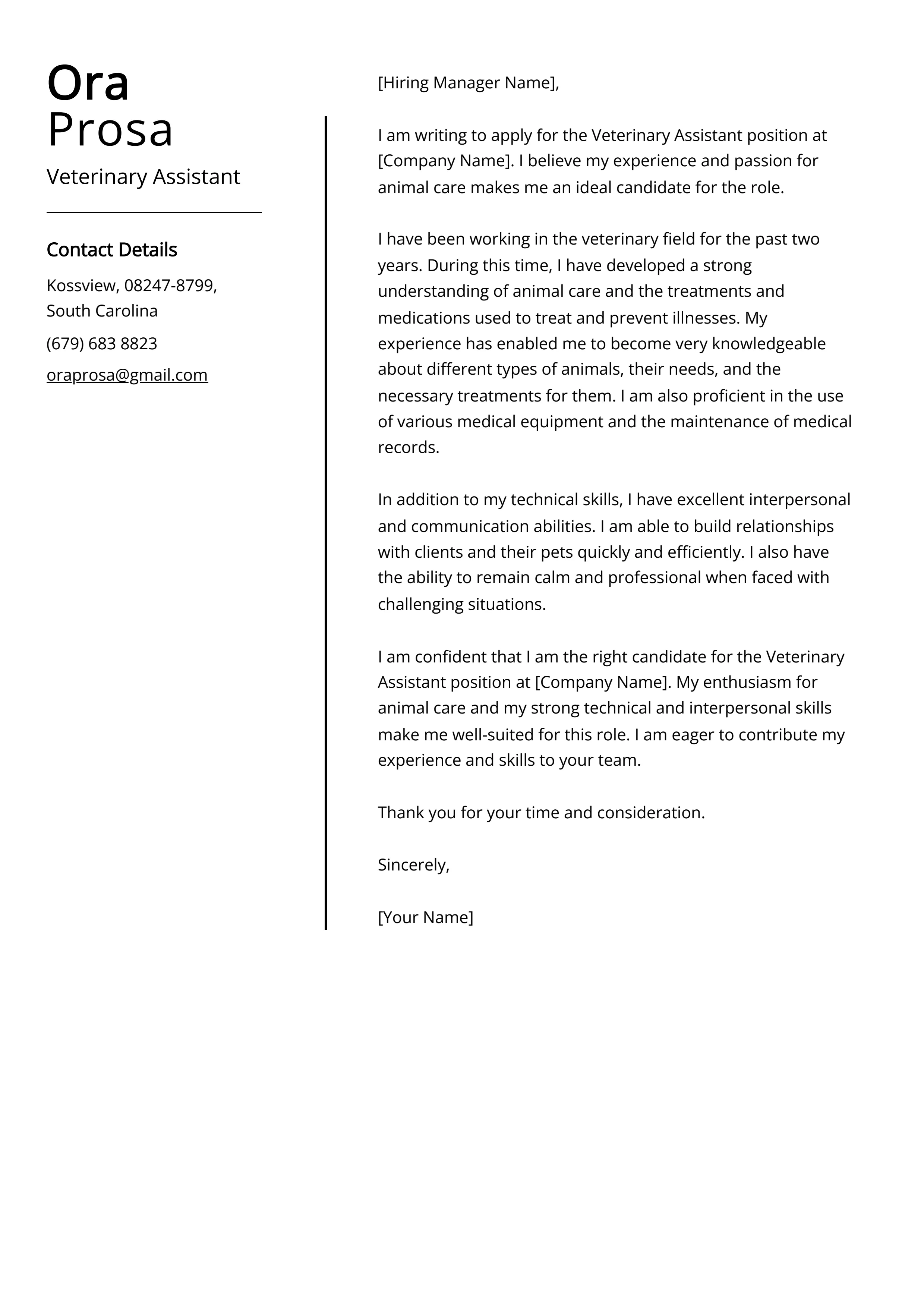
The most effective cover letters are tailored to the specific job and the veterinary clinic. Generic cover letters that don’t speak to the specifics of a particular role are easily identifiable. Before writing your cover letter, carefully read the job description. Identify the key requirements, skills, and qualifications. Research the veterinary clinic to understand its mission, values, and culture. Customize your cover letter to address the specific needs of the clinic. Highlight how your skills and experience align with the requirements of the job. Show that you understand the clinic’s goals and how you can contribute to its success. This personalized approach is what makes your cover letter stand out and increases your chances of getting an interview. Tailoring your cover letter demonstrates your genuine interest and attention to detail.
Veterinary Assistant Cover Letter Examples
Reviewing examples of veterinary assistant cover letters can help you understand how to structure your own. The format and content can vary based on your experience and background. Tailor any examples to match your individual skills and experiences. When using these examples, be sure to adapt them to match your specific situation and the specific requirements of the job you are applying for. Your goal is to create a personalized cover letter that demonstrates your unique qualifications and passion for animal care. Here are some examples that should provide some insights.
Example 1 Recent Graduate
This cover letter example is tailored for a recent graduate with limited work experience, focusing on academic achievements, relevant coursework, and volunteer experience. The goal is to emphasize the candidate’s eagerness to learn and their passion for animal care. Highlight your education. Showcase any relevant courses, such as animal anatomy, veterinary medicine, or animal behavior. Mention any clinical rotations or internships you completed during your studies. Include any volunteer experience at animal shelters or veterinary clinics. Demonstrate your skills. Even if you have limited experience, showcase your abilities and enthusiasm. Mention specific tasks you performed or skills you learned. Show your eagerness to learn. Your cover letter will show the hiring manager that your desire to succeed makes up for the experience.
Example 2 Experienced Assistant
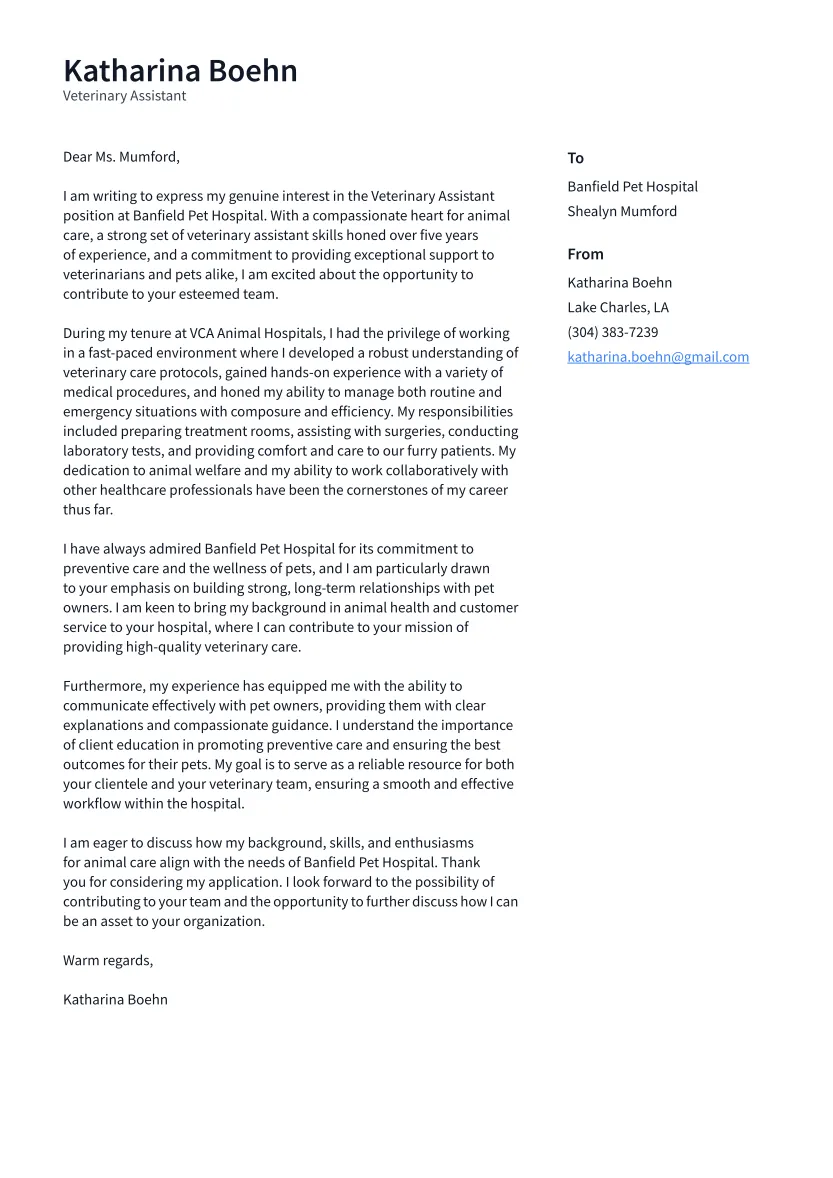
This cover letter example focuses on an experienced veterinary assistant. The goal is to highlight the candidate’s experience and skills to show they are suitable for the role. Focus on your work experience. Highlight your previous roles and the number of years you have worked as a veterinary assistant. List your responsibilities. Mention specific skills, such as assisting with surgeries, administering medications, or client communication. Emphasize your achievements. Quantify your accomplishments whenever possible, showing the impact of your work. Include specific examples, like how you improved client satisfaction or streamlined clinic processes. The employer wants to hire experienced candidates for their practice. Your cover letter must show them why you are the best choice.
Example 3 Career Changer
This example is for those looking to transition into a veterinary assistant role from a different career. The goal is to show how their previous skills can be transferable to the veterinary field. Explain the reasons behind your career change. Explain why you are interested in becoming a veterinary assistant. Relate your prior skills to the role of a veterinary assistant. Highlight the skills you’ve gained that are applicable to the role. Include your transferrable skills. Give examples of skills from your previous career that are relevant, such as communication or organization skills. Emphasize your passion. Show that you are willing to learn and are dedicated to animals. Mention how you have been involved in animal care. This cover letter is used to emphasize your transferable skills, making sure you will get the job, even if you don’t have direct experience.
Review and Refinement
After you have written your cover letter, it’s time to review and refine it. Proofread your cover letter carefully to ensure there are no spelling, grammar, or punctuation errors. Ensure that your formatting is consistent, and the layout is clean and professional. Verify that the language is clear, concise, and free of jargon. Make sure it’s personalized to match the specific job. Ask a trusted friend, family member, or career advisor to review your cover letter and provide feedback. This step is critical to ensure your letter is well-written and error-free. Reviewing and refining your cover letter is critical. Your goal is to make your cover letter as strong as possible before submitting your application. By taking the time to review and refine your cover letter, you can increase your chances of securing an interview and landing your dream job as a veterinary assistant.
